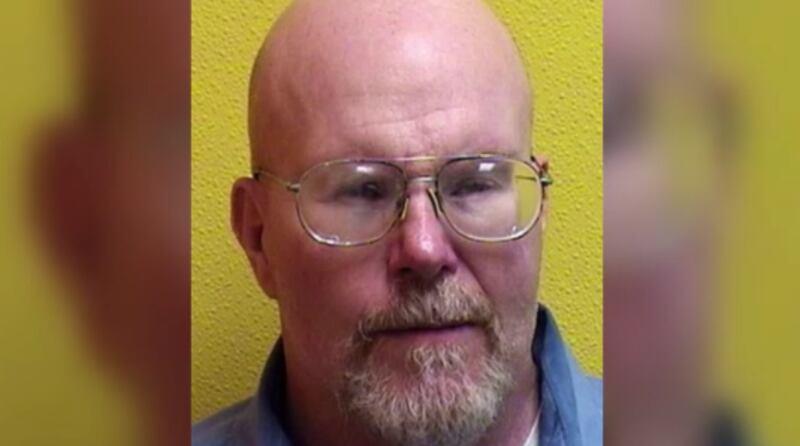CLEVELAND — A Cleveland man convicted in the 1989 shooting death of his stepbrother has married the man’s sister as he awaits a new trial in the alleged murder.
John Tiedjen and Crystal Straus, also of Cleveland, exchanged vows over the weekend. Tiedjen’s attorney, Kimberly Corral, officiated their wedding.
Tiedjen, 57, was released on bond July 22 after serving 32 years in prison for the murder of 18-year-old Brian McGary in 1989. Tiedjen was 25 years old when McGary was found dead in the apartment the men shared.
Tiedjen, who was on probation for a rape conviction, said he believes McGary committed suicide.
The inmate’s romance with Straus began with a letter she wrote to him in prison in which she offered forgiveness in her brother’s death, News 5 in Cleveland reported. She ultimately came to believe in his innocence.
They married at Tiedjen’s home, where he is on house arrest until his trial.
“With all my heart I love her. There is nobody else I think about, and I want to be with her my whole life,” Tiedjen told the news station. “And I wrote her a letter back and I said, ‘I didn’t do it, take a look at this stuff.’”
“I love him, obviously,” Straus said. “If I didn’t love him, I would not be sitting here with him.”
Murder or suicide?
According to court records, Tiedjen and McGary, who were “as close as natural brothers,” lived together in the upstairs apartment of a house in Cleveland’s Slavic Village neighborhood. On the morning of April 1, 1989, Tiedjen reported finding McGary’s body lying on the floor of his bedroom.
On the bed was a pool of blood and a bloody knife, the Cleveland Plain Dealer previously reported. McGary had an inch-deep stab wound to the chest and a gunshot wound to the forehead.
A .22-caliber rifle was lying at his feet.
Below are images of the scene recreated by Evidence Room, a company that provides crime scene reconstruction and forensic animation.
“Initially, Tiedjen told his family and friends that he did not know how McGary died, although he believed McGary committed suicide,” reads a 2019 appeals court ruling.
Tiedjen was arrested later that same day, and after three days of interrogation, he gave detectives a written statement claiming he’d shot McGary in self-defense after a night out drinking together.
According to the Plain Dealer, a Cleveland detective repeatedly lied during the interrogation about the strength of the case against Tiedjen, who had said he didn’t remember what happened after he and McGary got home. The detective also allegedly threatened Tiedjen and told him he’d get a better deal if he said he’d shot his stepbrother in self-defense.
Tiedjen’s biological brother also told detectives Tiedjen had confessed to killing McGary.
The newspaper reported that Tiedjen’s fingerprint was found on the stock of the rifle. None of his blood was found, however, and Tiedjen told News 5 this week that there was no physical evidence tying him to the shooting.
“I had no powder burns, no gunshot residue, no blood, no cuts, no scrapes, nothing on my person or me or my clothing,” he said.
Watch News 5′s report on Tiedjen’s marriage and court case below.
McGary’s blood was found on the barrel of the rifle, indicating he’d been shot at fairly close range. Detectives found several .22-caliber bullets in McGary’s pants pocket.
Six weeks after his arrest, Tiedjen’s trial was underway. He recanted his confession, professing his innocence, but on June 2, a jury found him guilty of murder with a firearms specification.
Tiedjen was sentenced to 15 years to life in prison. An additional three years were tacked on for the use of a firearm, court documents state.
After the trial, Tiedjen’s appellate lawyers learned that McGary was on prescription medication that was later determined to carry an increased risk of suicidal tendencies, the paper reported. McGary’s father had also killed himself several years earlier.
All Tiedjen’s appeals were denied until 2016, when his defense attorneys sought to file a motion for a new trial based on newly discovered evidence. They argued that more than 70 crime scene photos had been kept hidden by police, the prosecutor or both.
More than 30 pages of police reports were also withheld, his lawyers alleged.
“Tiedjen further argues that the newly discovered photographs differed, allegedly in substance, from the 10 photographs of the crime scene that were introduced as evidence during Tiedjen’s murder trial,” the court documents state.
The defense argues that the suppressed photos showed evidence that was not in the pictures introduced at trial, and that the government manipulated the crime scene. According to the appeals court, one photo showed a folded piece of paper sticking out of McGary’s pocket as he lay dead.
The defense theorizes that the paper, which was never submitted as evidence, could have been a suicide note.
In another newly discovered image, McGary’s ex-girlfriend’s purse was shown in his bedroom when his body was discovered. A woman’s vest and a man’s jacket were also visible.
The items were not in the photos introduced at trial.
The Plain Dealer reported that the ex-girlfriend was also allowed into the crime scene a few days after the fatal shooting to retrieve her belongings.
What did the photos show?
In 2017 hearings on the issue, all the photos were introduced as evidence. Daniel Chapin, one of Tiedjen’s trial attorneys, testified that he’d never seen any photos other than the 10 images introduced in 1989.
“The reason I can be confident about that is that in some of the — there was evidence in the statement that Tiedjen had called his mother and expressed that his stepbrother committed suicide, and the note would have been followed up, and the juxtaposition of the weapon would have been further investigated, but we didn’t do any of that because we didn’t know about it,” Chapin testified.
According to the Plain Dealer, the photos indicated that two sets of crime scene photos had been shot several days apart. The first set showed items like the purse and jacket, as well as Tiedjen’s eyeglasses sitting on the coffee table.
In the second set of images, his eyeglasses had been moved to the floor next to a pool of McGary’s blood, the newspaper reported.
Corral argued earlier this year that police investigators may have gone to the house and staged evidence to support Tiedjen’s alleged confession.
“Once they coerced Mr. Tiedjen into their statement, they had to make the evidence look like that happened,” the attorney said.
Corral also argued that the purse, vest and jacket indicated it was possible that others were present in the apartment when McGary died.
A witness told authorities in 2002 that he’d seen a man and woman run from the house after the gunshot and flee in a black truck, the Plain Dealer reported.
Despite the newly discovered images, Tiedjen’s 2017 request for a new trial was denied. The trial judge determined that the photos that weren’t made available to his attorneys in 1989 weren’t sufficient to warrant a new trial.
When Tiedjen appealed to the Eighth District Court of Appeals, however, the photos and all other evidence from both the original trial and the 2017 hearings had disappeared.
Read the Eighth District Court of Appeals decision below.
John Tiedjen Appeals Court Decision by National Content Desk on Scribd
In a 2-1 decision, the appeals court ordered a new hearing to determine if Tiedjen and the defense were responsible for that disappearance. If the defense was not to blame, Tiedjen could be granted a new trial.
That hearing was held in June. At that time, Corral argued that her client’s conviction could not stand when it was based on a case in which more than 70 crime scene photos, as well as 32 pages of police reports, were withheld from the defense.
“Every aspect of the case that the state relied on to get a conviction has been undermined by the evidence they withheld, that has now been revealed by Mr. Tiedjen,” Corral said, according to the Plain Dealer.
In the June hearing, the defense also presented testimony from a crime scene expert, Scott Roder, who owns Evidence Room, which provides crime scene reconstruction and forensic animation.
>> Read more true crime stories
Roder testified that photos of McGary’s bullet wound indicate the rifle was fired at close range, closer than the 18 inches that prosecutors allege. He also accused police of improperly wrapping McGary’s hands in plastic instead of paper, which could account for a lack of gunshot residue.
The Plain Dealer reported that Roder told the court his company’s video reconstruction indicated McGary tried to stab himself to death before sitting on his bed, putting the butt of the rifle on the floor and leaning his forehead toward the barrel before pulling the trigger.
“There is no evidence, physically or forensically, to suggest that John Tiedjen committed murder,” Roder testified.
Cuyahoga County Common Pleas Court Judge Dick Ambrose tossed Tiedjen’s conviction on June 22. Ambrose ruled that there was a “reasonable probability the results of the trial would have been different” if prosecutors had given the defense all the photos and police reports in 1989.
John Tiedjen, imprisoned for more than 30 years in the killing of Brian McGary, deserves a new trial, Cuyahoga County Common Pleas Court Judge Dick Ambrose ruled. https://t.co/bppUKabvfR
— clevelanddotcom (@clevelanddotcom) June 23, 2021
The judge also cited the testimony of the defense’s crime scene expert in his reasoning for the new trial, the newspaper reported.
“(T)he prosecutor’s office spent years of taxpayer resources promoting the argument that John got a fair trial, despite the fact that (it) withheld all of the police reports and almost all of the crime-scene photographs in the case,” Corral said afterward. “It’s hard for me to believe that, in America in 2021, any participant in the system would defend the constitutionality of such a conviction.”
Cuyahoga County Prosecutor Michael O’Malley has denied that his office withheld evidence or that detectives coerced Tiedjen into confessing. Spokesman Tyler Sinclair told the Plain Dealer in June that prosecutors would appeal the judge’s ruling.
Tiedjen is due in court for a pretrial hearing Aug. 31.
He and his new bride told News 5 that gaining his permanent freedom will not be easy.
“We’ll get through this,” Straus said. “It’s going to be challenging. There’s no doubt about it.”
©2021 Cox Media Group








